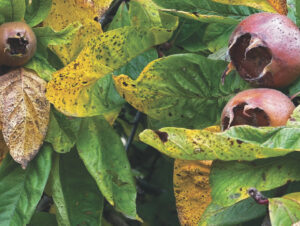Isabelle Thompson reviews Dirty Martini by Natalie Shaw (Broken Sleep Books, 2023)
Described as “wonderfully bananas” by the TLS, Natalie Shaw creates poetry which has more than a faint hint of absurdity. Her second pamphlet, Dirty Martini, follows her debut, Oh Be Quiet (Against the Grain, 2020), reviewed in The Friday Poem here, and is even more playful and bizarre. Whilst the poems in Oh Be Quiet nod towards more conventional themes, such as motherhood and womanhood, Dirty Martini’s preoccupations are sometimes difficult to pin down. That said, both pamphlets share an interest in children in peril, and both play around with fairy tales to create disturbing and powerfully evocative scenes.
The poems in Dirty Martini seem, at first glance, child-like and naïve. However, on closer examination, they reveal a darkness and an edge that is unsettling. ‘Poached Trout’ which opens the pamphlet, embodies this treading of the line between playful and sinister: “how I love you little fish”, says the speaker, “happy fish” she repeats, before sliding in with a chilling, “you can’t breathe”.
The poems in Dirty Martini seem, at first glance, child-like and naïve. However, on closer examination, they reveal a darkness and an edge that is unsettling
‘Pig in Space’, meanwhile, uses adolescent text speak to deliver an at-once dark and ridiculous story of an animal abandoned in space:
ur so alone out here
[…]
I can’t hear u no one can
cry all u like
‘Party Invitation with Knife’ takes the form of a traditional children’s party invite, but with a macabre twist – this is an invite to a “knife fight”. “It’ll be fun / For me”. The poem is both funny and unnerving. ‘Gingerbread House’ also seems initially childish and humorous. A girl licks a house made of ice and gets her tongue stuck – harmless enough, until the girl begins to turn to ice:
Girl: Mum I’m made
Of ice now mum
I think I’m
an ice girl
The poem ends, “It is terrible, terrible”. This piece takes its title from fairy tale lore; other poems in the pamphlet also reference childhood fables and folk stories to present a seemingly naïve front with a darker undercurrent. For example, ‘Walk in the Park’ takes the traditional teddy bears’ picnic and makes it menacing. In this version, it is the “little girl” “being eaten”. ‘Baba Yaga Learns Not to Drown’ makes use of the ambiguous figure from Slavic folklore who sometimes harms those she encounters and sometimes takes a caring, maternal role. Throughout this pamphlet, children and childhood are celebrated, and endangered.
As well as fairy stories, many of Shaw’s poems use the tropes, language and imagery of traditional children’s nonsense poetry such as that by Lear or Carroll. ‘Party for Hares’ is reminiscent of Alice in Wonderland, with its out of control humanoid hares “treading crisp shards into the carpet” and “making a mess of everything”. “They have a purpose unrelated to fun”, says the speaker. “They will break everything. / They have their own purpose in mind.” ‘Vegetable Love’ brings to mind poets such as Benjamin Zephaniah whose playful poetry about vegetables (‘Eat Your Words’, for example: “I am a veggie table / a table made of veg”) captures the imagination of young and older readers alike. “We were green and salad-like”, reads Shaw’s poem – but, true to form, she ends on a threatening note:
We waited with our crispy hearts
Desiring only slicing
‘Trickster at Acton Central’ uses the techniques of children’s poetry in order to build to an uncomfortable pitch. It relentlessly repeats the phrase “I am” some 25 times, as well as making use of rhyme to arrive at its crescendo: “swallow”, “follow”, “narrow”, “borrow”, “farrow” it reads. This poems also explores transformation – it undertakes flights of fancy worthy of a child’s imagination to lead the reader through a long poem of metamorphosis. “I am the bicycle”, “I am the dark fish”, “I am the mirror that shunts away lamplight”. ‘Caribou’ also contains similar transformation – it involves a magic realism perhaps more often found in writing for children. The poem describes a woman falling “asleep in the ice house” and waking up with a “heavy” head of “antlers”.
These are poems that delight and menace
These are poems that delight and menace. Although written for adults, it is easy to imagine them being read to children. Like all the best children’s literature, this poetry is capable of entertaining the young whilst hinting at something deeper and more unsettling for the adults doing the reading. These quirky, edgy poems are deceptively naïve, and they will stay in this reader’s mind and ear long after closing the book.
Isabelle Thompson holds an MA in creative writing from Bath Spa University. She has been published or has work forthcoming in a range of magazines including The Interpreter’s House, Stand and The New Welsh Review. She was the winner of the 2022 Poets and Players Competition and a runner up in the 2021 Mslexia Poetry Competition. She tweets @IzzyWithTheCats.

